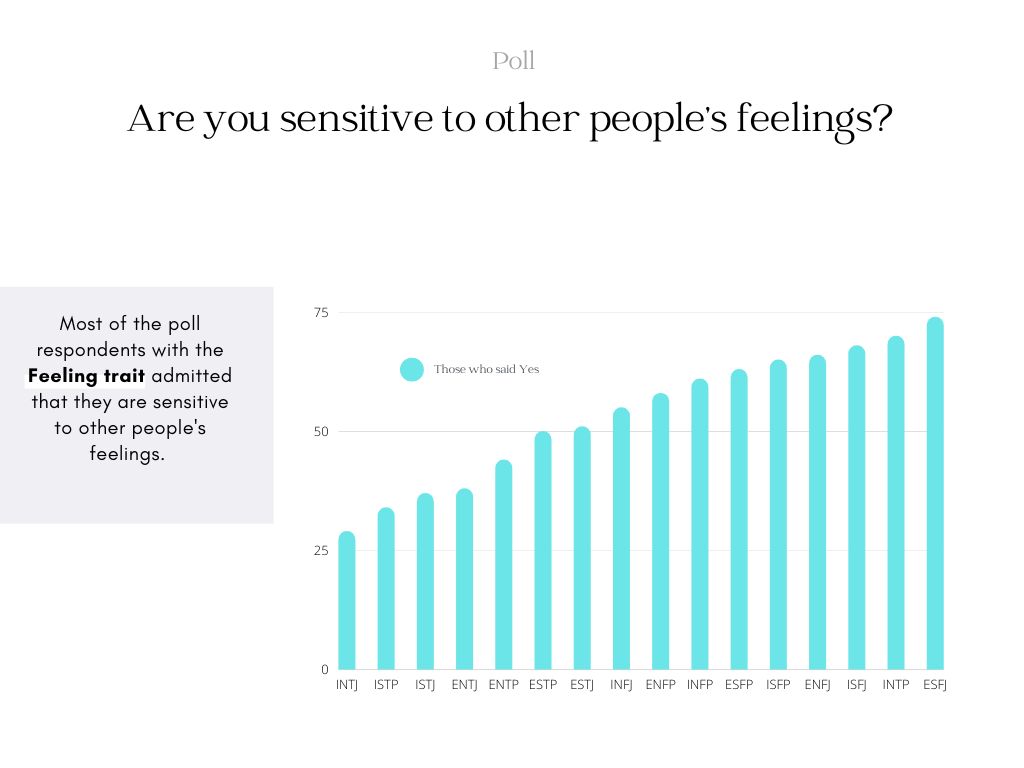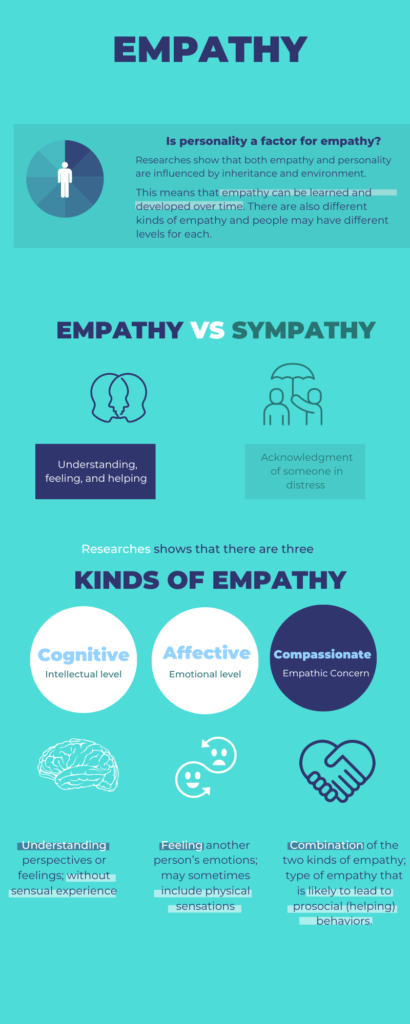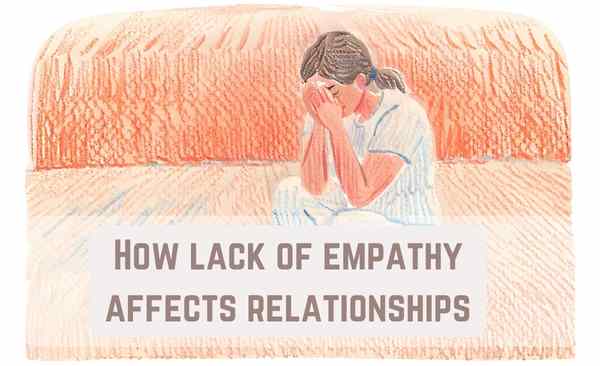If you’re trying to find out how lack of empathy affects relationships, let’s first go over our poll about being sensitive to other people’s feelings.
Question: Are you sensitive to other people’s feelings?

Interestingly, our respondents with the Feeling personality trait are more sensitive to other people’s feelings
Being sensitive to other people’s feelings can be related to their empathy skill.
How lack of empathy affects relationships
A lack of empathy is one of the most common issues in relationships.
Lack of empathy is one of the most common problems in relationships. It can lead to misunderstanding, conflict, and even resentment. Additionally, a lack of empathy can lead to resentment and feeling undervalued in a relationship.
You know that feeling you get when you just can’t seem to put yourself in your partner’s shoes? When don’t you understand how they could feel the way they do? You’re not alone.
Empathy in relationships is about being able to see things from their perspective, and it’s essential for healthy communication and relationships. Without empathy, building trust and creating a meaningful connection with your partner is difficult.
Additionally, a lack of empathy can make maintaining intimacy and closeness in a relationship difficult. If you’re unable to empathize with your partner, chances are you’re not understanding or connecting with them on a deep level.
Ultimately, this lack of connection can lead to feelings of distance and dissatisfaction in the relationship.
What is Empathy?
Empathy is the ability to understand and share the feelings of another person. It is an important part of emotional intelligence and essential for healthy communication, especially as a part of romantic relationships.

When we lack empathy in relationships, we are more likely to misunderstand or misinterpret what someone is saying. We may also struggle to see things from their perspective, which can lead to conflict and damage relationships.
Empathy vs. Sympathy
Empathy and sympathy are often confused, but they are two very different things.
Sympathy is acknowledging that another person is going through struggles. Empathy, on the other hand, is about understanding someone else’s experience, sharing their feelings, and sometimes even helping out with what they are going through.
Kinds of Empathy
There are three different types of empathy that we can display in our everyday lives. They are:
1. Cognitive empathy
This is when we can understand how another person feels and why they might feel that way. We can “put ourselves in their shoes,” so to speak.
2. Emotional empathy
This is when we share the emotions that another person is experiencing. We feel what they are feeling.
3. Compassionate empathy
This is when we not only understand and feel another person’s emotions but also want to do something to help relieve their suffering in some way. Compassionate empathy is often referred to as “altruistic” empathy.
Cognitive empathy is the most common type of empathy, and it is the kind of empathy that is most important in relationships. Emotional empathy can sometimes be helpful in relationships, but it can also lead to problems if we are not careful.
For example, feeling too much of another person’s pain can be overwhelming and lead to burnout. Compassionate empathy is less common, but it can be beneficial in times of crisis or when someone is going through a difficult time.
What causes a lack of empathy?
There can be many different causes for lack of empathy. It could be due to various factors, including genetics, brain damage, or early life experiences.
For some people, it might be that they simply haven’t had any experiences that have led them to develop empathy. Others might have chemical imbalances or other mental health conditions that make it difficult for them to empathize with others. And still, others might just be naturally more self-centered and focused on their own needs and emotions.
Whatever the cause, a lack of empathy can make it very difficult to connect with other people and lead to social isolation and conflict.
How to Develop Empathy
If you find that you struggle with empathy, don’t fret! It is a skill that you can learn with time and practice. Here are some tips for how to develop empathy:
1. Pay attention to your own emotions
One of the best ways to understand the feelings of others is to first understand your own emotions first. Pay attention to what you are feeling and why you are feeling it. This will help you to be more aware of the emotions of others.
For example, at one point you may realize that the anger you are feeling is actually frustration, by having a deeper probe into your emotions you can start to understand that just how people react to situations is not the actual extent of what they are feeling.
2. Try to see things from other people’s perspectives
When talking to someone, try to imagine how they might feel. What is going on in their life that might be causing them to feel this way? What might they be thinking and feeling?
3. Listen more than you talk
Many of us want to jump in and offer advice when someone is going through a tough time. But often, people just want to be heard and understood. So, instead of giving advice, try just listening and being there for the person.
4. Practice compassion
When you see someone suffering, practice wishing them well and sending them positive thoughts. You can also try to help out in practical ways if you are able to.
5. Seek out opportunities to practice empathy
There are many opportunities to practice empathy in our everyday lives. If you make an effort to be more aware of them, you will find that you can better empathize with others.
A lack of empathy can be a barrier to forming and maintaining relationships. But with a little effort, you can learn how to develop empathy and use it to improve your relationships.
Can you be in a relationship with someone who lacks empathy?
Yes, you can be in a relationship with someone who lacks empathy. However, this type of relationship is likely to be dysfunctional and emotionally draining.
People who lack empathy do not understand or feel the emotions of others. They are often unable to put themselves in other people’s shoes, which makes it difficult for them to empathize with others. As a result, they may not be very good at providing emotional support or showing compassion.
If you are in a relationship with someone who lacks empathy, it is important to set boundaries and protect yourself from being hurt emotionally. You need to make sure that you get the emotional support that you need from other sources.
It may also be helpful to talk to a therapist or counselor to help you deal with the challenges of this type of relationship.


